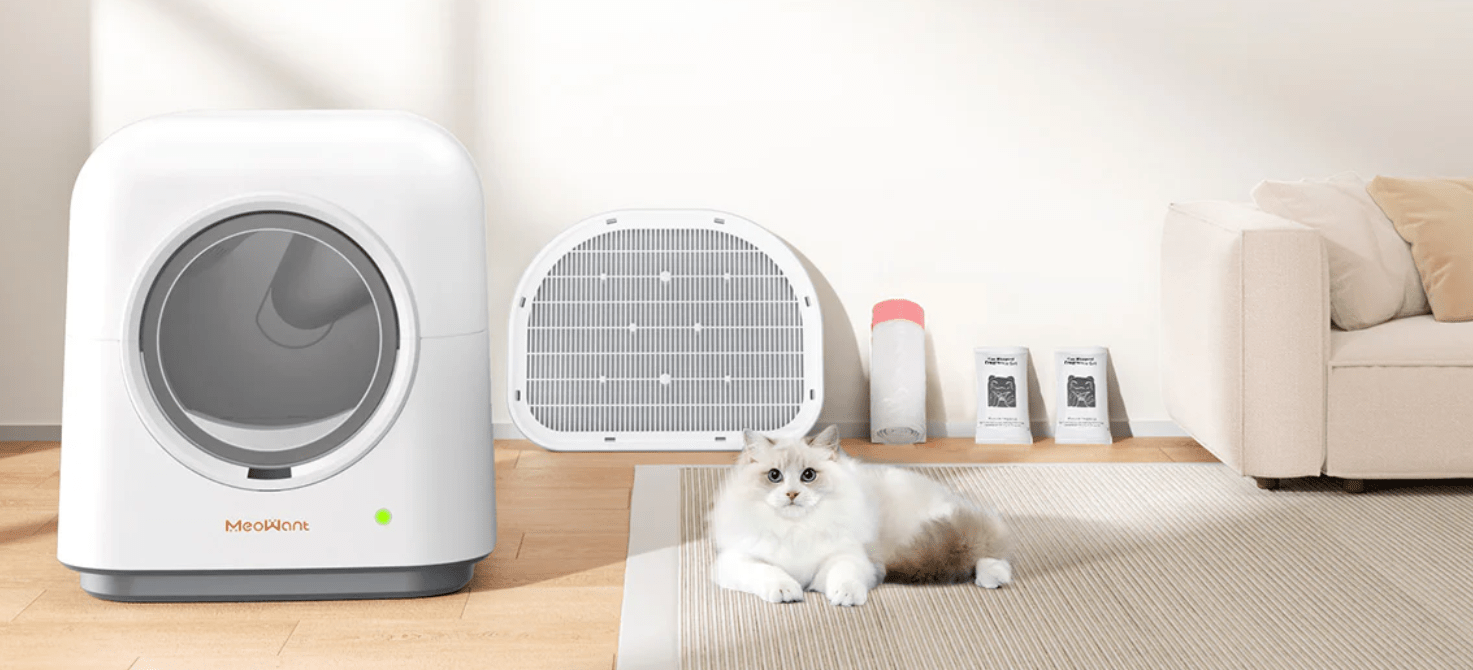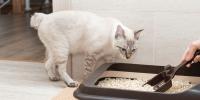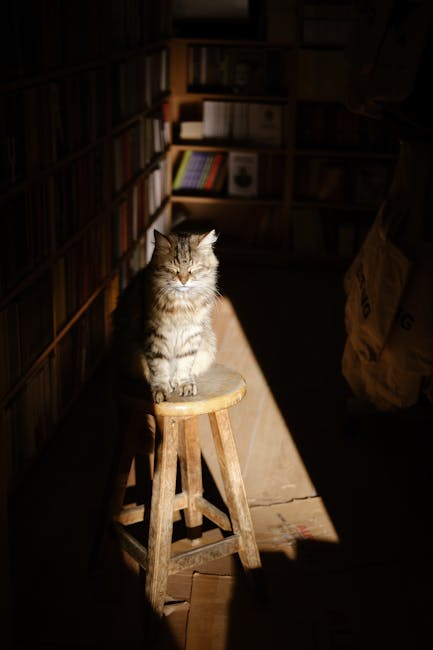Are you wondering how often you should change your cat’s litter box? You’re not alone.
Many cat owners struggle with finding the right balance between keeping their feline friends happy and maintaining a clean home. A clean litter box is more than just a chore; it’s a crucial part of your cat’s health and happiness.
Imagine stepping into a messy bathroom—unpleasant, right? Your cat feels the same way about a dirty litter box. We’ll uncover the secrets to maintaining the perfect litter box schedule, helping you keep your home fresh and your cat content. Stick around to discover tips that could transform your cleaning routine and improve your cat’s well-being.

Credit: meowant.com
Frequency Of Changing Litter
Keeping your cat’s litter box clean is essential for their health and comfort. The frequency of changing litter affects odor control and hygiene. Regular maintenance prevents bacteria buildup and keeps your home fresh. Establishing a cleaning schedule helps your cat feel happy and secure.
Daily Scoop Routine
Remove clumps of waste every day. This keeps the litter box clean and odor-free. Use a scoop with holes to separate clean litter from waste. Dispose of the waste in a sealed bag. Daily scooping encourages your cat to use the box consistently.
Weekly Full Change
Replace all the litter once a week. Empty the entire box during this change. Wash the box with mild soap and warm water. Avoid strong-smelling cleaners that can deter your cat. Dry the box completely before adding fresh litter. A weekly full change keeps the environment healthy.
Monthly Deep Clean
Perform a deep clean every month. Scrub the box thoroughly to remove stains and odors. Check for cracks or damage that may harbor bacteria. Replace the litter box if it shows wear. Deep cleaning helps maintain a safe and clean space for your cat.

Credit: perfectpetzzz.com
Factors Influencing Litter Box Maintenance
Keeping your cat’s litter box clean is essential, but how often you should change it depends on several factors. Understanding these can help you maintain a fresh environment that your cat will appreciate. Let’s look at what influences litter box maintenance and how you can tailor your cleaning routine.
Number Of Cats
The more cats you have, the faster the litter box gets dirty. Each cat produces waste, so a box shared by multiple cats needs more frequent cleaning. If you have two or three cats using one box, you might need to scoop daily and change the litter completely every few days.
Have you noticed your cat avoiding the box? It could be a sign that the box isn’t clean enough. Providing one litter box per cat plus an extra can reduce mess and stress.
Type Of Litter Used
Different litters absorb moisture and control odor in varying ways. Clumping litter can make it easier to remove waste daily, while non-clumping types may require more frequent complete changes. Some natural litters might need changing more often because they don’t mask smells as well.
Consider your cat’s preferences too. Some cats dislike scented litters, which might affect how often you need to change the box to keep it fresh.
Cat’s Health And Age
Older cats or those with health issues may use the litter box more frequently or have looser stools. This means you may need to clean the box more often to maintain hygiene. If your cat has a urinary tract infection or digestive problems, watch the box closely for cleanliness and odors.
Have you checked your cat’s litter box habits recently? Changes can signal health problems that require prompt attention.
Litter Box Size And Type
A larger litter box provides more space for your cat and can stay cleaner longer. Covered boxes may trap odors but need more frequent cleaning to avoid buildup. Open boxes dry faster but might spread litter outside the area.
Think about your cat’s preferences here as well. Some cats avoid covered boxes, which can affect how often you clean. Matching box size and type to your cat’s habits can reduce cleaning frequency and keep your home smelling fresh.
Signs Your Cat’s Litter Box Needs Attention
Knowing when your cat’s litter box needs attention can save you from unpleasant surprises and keep your furry friend happy. Cats are sensitive creatures who notice even small changes in their environment. If you spot certain signs, it’s time to clean or change the litter box to maintain a healthy and comfortable space for your pet.
Odor Levels
Have you noticed a strong, unpleasant smell coming from the litter box? Persistent odors mean the litter isn’t absorbing waste effectively anymore. Even if you scoop daily, the buildup of urine can cause a lingering smell that signals it’s time to replace the litter completely.
Try this simple test: if the odor is noticeable from a few feet away, don’t wait any longer. Clean the box thoroughly and add fresh litter. Your cat will appreciate a fresh-smelling spot, and you’ll avoid unwanted smells in your home.
Cat’s Behavior Changes
Is your cat suddenly avoiding the litter box or scratching outside it? Behavioral changes often indicate discomfort with the litter box’s cleanliness. Cats dislike dirty or smelly boxes, and they may choose to go elsewhere rather than use a neglected box.
Pay close attention if your cat starts meowing near the box or appears restless. These subtle cues can tell you the litter box needs immediate attention. How often do you observe your cat’s bathroom habits?
Litter Clumping Issues
Have you noticed the clumps in the litter box breaking apart or not forming properly? Poor clumping can mean the litter is saturated and losing its effectiveness. This makes cleaning more difficult and can lead to more odor and mess.
When clumps crumble, it’s a clear sign to change the litter. Using high-quality clumping litter and replacing it regularly ensures your cat’s box stays clean and easy to maintain. What type of litter do you use, and how often do you refresh it?
Tips For Maintaining A Clean Litter Box
Keeping a cat’s litter box clean is essential for your pet’s health and comfort. A clean box prevents odors and encourages your cat to use it regularly. Small efforts daily make a big difference in maintaining freshness. Here are some useful tips to keep the litter box in top shape.
Choosing The Right Litter
Selecting the proper litter helps control odor and absorb moisture. Clumping litter is easy to scoop and keeps the box cleaner longer. Unscented litter reduces irritation for sensitive cats. Avoid dusty types to protect your cat’s lungs and keep your home cleaner. Experiment with different textures to find what your cat prefers.
Proper Cleaning Techniques
Scoop waste at least once a day to prevent smells and bacteria buildup. Wash the litter box with mild soap and warm water weekly. Avoid harsh chemicals that can harm your cat or leave strong odors. Dry the box completely before adding fresh litter. Use a dedicated brush or sponge to keep the box hygienic.
Using Liners And Deodorizers
Liners make cleaning easier by preventing litter from sticking to the box. Choose sturdy liners that fit well without tearing. Deodorizers help control smells but use them sparingly. Natural options like baking soda work well without harsh chemicals. Avoid sprays with strong fragrances that may bother your cat.
Common Mistakes In Litter Box Care
Taking care of your cat’s litter box might seem straightforward, but many pet owners make mistakes that can lead to unpleasant odors and unhappy cats. These common errors can affect your cat’s health and behavior without you even realizing it. Understanding what to avoid can save you time and keep your feline friend comfortable.
Overlooking Regular Scooping
Leaving waste in the litter box for too long is one of the biggest mistakes. Cats are very clean animals and may refuse to use a dirty box, leading to accidents elsewhere in your home. Aim to scoop the litter at least once a day to keep the box fresh and inviting.
Think about how you feel using a dirty bathroom. Your cat’s feelings are not much different. Even if you change the entire litter weekly, daily scooping is essential to maintain hygiene.
Ignoring Odor Control
Bad smells can build up quickly if you don’t manage odor properly. Simply scooping isn’t always enough—using odor-absorbing litter or adding baking soda can help. Have you noticed your cat avoiding the box because of a strong smell?
Ignoring odor control can also affect your home’s air quality and your relationship with your cat. Consider placing the box in a well-ventilated area and testing different litters to find what works best.
Using Harsh Cleaning Products
Many people use strong chemicals to clean the litter box, thinking it will sanitize it better. However, these can leave residues that irritate your cat’s paws or deter them from using the box. Mild, unscented soap and warm water usually do the job safely.
Have you ever noticed your cat avoiding the litter box after a deep clean? This could be due to the smell of harsh cleaners. Stick to gentle products to keep your cat comfortable and your cleaning effective.
Impact Of Cleanliness On Cat’s Health
Cleanliness of a cat’s litter box directly affects its health. Dirty litter boxes can cause health problems and discomfort. Cats are very sensitive to their environment. A clean litter box promotes good hygiene and well-being. Regular cleaning prevents the buildup of harmful bacteria and odors.
Preventing Urinary Issues
Dirty litter boxes increase the risk of urinary tract infections. Bacteria thrive in unclean environments. Cats may avoid using a soiled box, leading to holding urine too long. This can cause bladder inflammation and infections. Changing litter often keeps the area sanitary and safe.
Reducing Stress And Anxiety
Cats dislike dirty spaces for elimination. A smelly or messy box causes stress and anxiety. Stress weakens the immune system and affects overall health. Clean litter boxes create a calm environment. Cats feel secure and comfortable using a fresh box.
Avoiding Behavioral Problems
Unclean litter boxes often lead to unwanted behaviors. Cats may urinate outside the box to avoid dirt. This causes frustration for both cat and owner. Keeping the litter box clean encourages proper use. It supports good habits and a happy home.
Adjusting Litter Box Routine For Multiple Cats
Managing litter boxes for multiple cats needs extra care. Cats can be picky about their litter boxes. Each cat may have unique habits and preferences. A good routine keeps cats happy and the home clean. Adjusting the litter box routine helps avoid problems like accidents or stress. This section explains key points to consider for multiple cats.
Number Of Boxes Needed
The rule is simple: one box per cat plus one extra. For example, three cats need four litter boxes. Extra boxes reduce fights and territorial issues. Place boxes in different quiet, easy-to-access areas. Avoid crowding boxes in one spot to prevent stress.
Managing Different Preferences
Cats may prefer different types of litter or box styles. Observe each cat’s choice and adjust accordingly. Some cats like covered boxes; others want open ones. Keep the litter fresh and clean to satisfy all cats. Mixing litter types or box shapes can help meet different needs.
Monitoring Individual Habits
Watch each cat’s litter box use closely. Changes in behavior may signal health problems. Keep separate cleaning schedules for each box. Clean boxes daily and change litter regularly. This helps catch any unusual habits early. Understanding each cat’s routine improves care and comfort.

Credit: www.purina.com
Frequently Asked Questions
How Often Should I Scoop My Cat’s Litter Box?
Scoop your cat’s litter box at least once daily. Frequent scooping prevents odors and keeps the box clean. It also encourages your cat to use the box regularly, promoting good hygiene and health.
When Should I Completely Change The Cat’s Litter?
Completely change your cat’s litter every 1 to 2 weeks. This prevents bacteria buildup and odor. Frequent full changes keep the litter box fresh and more comfortable for your cat.
Does Litter Type Affect Cleaning Frequency?
Yes, clumping litter usually requires more frequent scooping but less frequent full changes. Non-clumping litter needs more frequent complete changes. Choose litter based on your cat’s preference and your cleaning routine.
How Many Litter Boxes Are Ideal For Multiple Cats?
Provide one litter box per cat plus one extra. This reduces territorial issues and keeps boxes cleaner. Multiple boxes also help maintain hygiene and prevent stress in multi-cat households.
Conclusion
Changing your cat’s litter box often keeps your home fresh and clean. A clean box helps your cat stay healthy and happy. Scoop waste daily and fully change the litter at least once a week. Watch your cat’s behavior to adjust cleaning if needed.
Clean litter boxes reduce bad smells and mess. A little effort each day makes a big difference. Your cat will thank you with comfort and good health. Keep a regular schedule for a happier pet and home. Simple steps lead to a cleaner, nicer living space.

